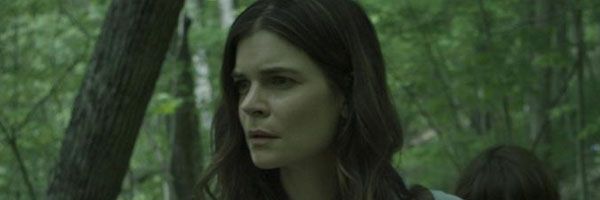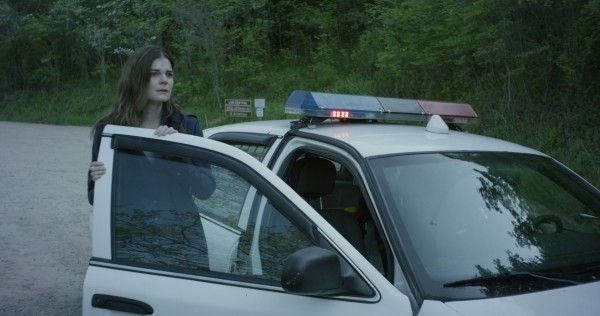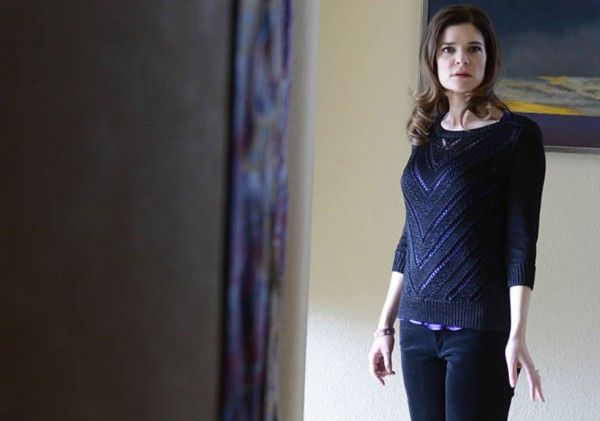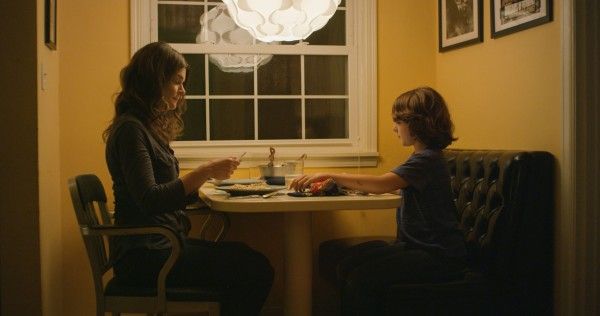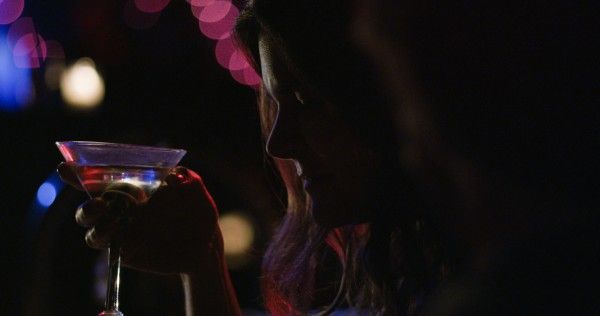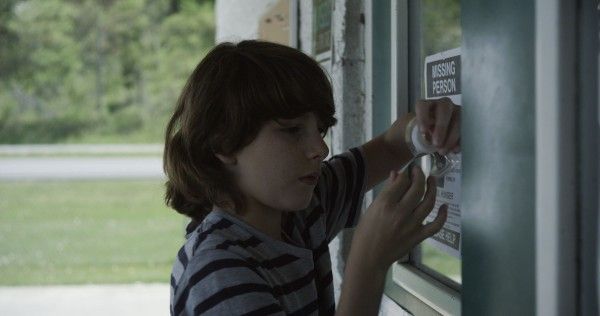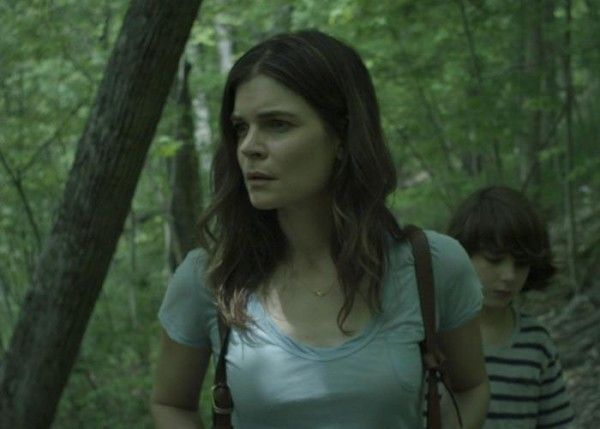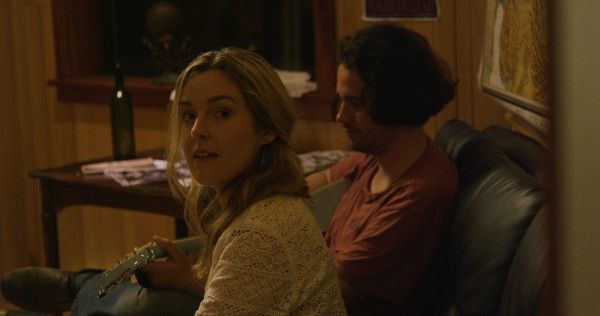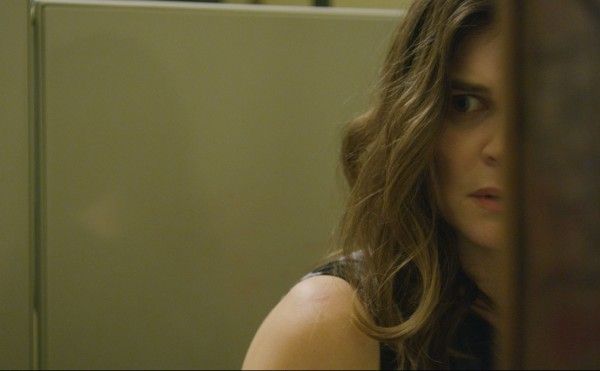After covering movies about raunchy anthropomorphic food, a blind man trying to kill home invaders and a kitten kidnapped by a street gang, it was extremely sobering and surprisingly refreshing to switch gears and catch the dramatic thriller Claire in Motion. Breaking Bad’s Betsy Brandt leads the film as the title character. When her husband disappears and the cops call off the search, Claire refuses to stop looking for him, sparking a journey that’s part missing person mystery and part examination of coming to terms with loss.
To be honest, had Brandt not starred in my grad school thesis film, Claire in Motion probably wouldn’t have been on my radar, but that’s the beauty of a festival like SXSW. You’ve got your big studio releases, the episodic line-up, the Midnight program and so much more. No matter where your taste lies, having such a wide variety of content in one place inspires you to explore.
Three and a half years after shooting “The Professor” together, it was a delight to reconnect with Brandt to talk about Claire in Motion alongside directors Annie J. Howell and Lisa Robinson. Check out what the trio told me about getting the project off the ground, diving into such intense material, the wide appeal of the film and much more in the interview below:
Question: Let’s start with what sparked the idea.
LISA ROBINSON: We were originally interested in telling a story about a woman who was at a time in her life when she thought she knew who she was and who her closest ones were, and something happens to sort of upend that and make her look at her life again and ask questions about who she is, who her husband is. And so that sense of exploring our identity was kind of the heart of where the story came from and then we came up with a location and the idea grew out of that.
There are so many thrillers, horror movies and bold comedies playing at the festival whereas you’ve got something far more grounded. Is it difficult to get something that isn’t big and high concept off the ground?
ANNIE HOWELL: In terms of bringing people into seats for the festival, everything’s aligned really well. I think that having some of these titles in contrast to the genre stuff - or having a light genre touch, which we do in our films, sort of a psychological drama that also has some thriller aspects, I feel like it’s been a great fit for SXSW. In terms of getting it off the ground, it’s an independent film so you know how it is, you’ve made them. It was a labor of love for so many people.
Was there any key element that took you from “we want to make a movie” to “we are making a movie?”
ROBINSON: We had some grants and award money that we used as seed money to start the process, but then we were able to get private financiers who liked our last film and were excited about seeing another film. And I think because we loved our script and because we worked so hard on it and were passionate about it, I feel like that energy kind of spread through to other people as we went and of course we were so delighted when Betsy joined the project, but all the way to the end I feel like that has fed the film and we’ve had faith in it and things have arrived whether it be resources or donations or financing.
Betsy, how did you get involved? Was the project pitched to you?
BETSY BRANDT: My team got the script from this casting office in New York that we really like and it was good material. It’s Jennifer Euston’s office and they sent it over to my team and they loved it and said, ‘We want you to look at this.’ They talked to both of you, and then once my manager spoke on the phone with them, she was like, ‘You have to talk to them.’ And then for me, that was like a done deal. But I was really drawn to the character and to the story. I thought it was great writing and it was completely opposite to the pilot I was going to shoot, and I always like to do something different from what I’ve just done.
Is that always your process when you pick projects? I remember for The Professor, first you sat down with us and then all of a sudden, we were making a movie together.
BRANDT: I was in New York for something and I saw you all and I said, ‘I like these young people. I want to work with them.’ It was also shorter so I knew I could fit it in my schedule. And it wasn’t Marie. At the time I was still shooting Breaking Bad and I was like, ‘Anything not Marie.’ And we knew Rick Peters and you had reached out to Rick and so Patty was like, ‘Just look at this. It’d be something that’d fit in your schedule.’ And it gave me a chance to work with you guys and my friend too, which sometimes you never get to work with the actors you love.
How much did the script change after you cast Betsy and beyond?
HOWELL: Certain little scenes here and there might have been added or subtracted, but I feel like the essence of the script is pretty true. Don’t you think?
ROBINSON: Oh yeah, for sure.
HOWELL: Just the heart of it and the tone on the page to what we were able to secure. Secure sounds wrong. It sounds like a housing acquisition. [Laughs] But we were able to create! I think where we really were doing our creative work was making sure that this was the film that we wanted to make next. The script writing process on this one, we gave it some time and it simmered in our brains a little bit so by the time we got to the shoot we really knew what we wanted to do.
And this is your second feature, right? Is there anything you learned from the first one that you took to this?
ROBINSON: Every film we’ve made has been sort of a non-repeatable model and they’re all really different. I think that we definitely grew as directors on that film and learned how to work with each other even better, but I can’t think of any specific lesson.
When you say “model,” do you mean the type or the production process?
ROBINSON: Both. Small, Beautifully Moving Parts was a road trip and so a lot of the production revolved around different cities and transportation so in that one we were flying into different cities and flying out of different cities, and we were using all these really cool locations in Arizona and California. In this one, I think what we did maybe learn or was solidified as an important thing for us was location. We know that we need to be excited about the location because that’s such a huge part of the visual aspect, and it’s not like we have a studio where we’re gonna build sets. We’re really gonna take advantage of the beauty and natural mood of a location. So Annie at the time was living in Ohio and we spent some time location scouting even a year earlier where we just wandered around and took lots of pictures and just sort of seeped into the mood of the backyards and the houses and the roads. I think the location as a place of inspiration was something we had done before and we continued to do that, and I think just having more faith in that is really valuable. It came from our first project.
You’ve got a pretty wide variety of locations here, too. The school, the right house, the right spot in the woods …
HOWELL: You know, slow burn location scout. I’d been living there and I knew we were going to make the film there, [so] any interesting place I found myself would just dovetail into the creating process. So it was more that way than like, ‘I need a roller skating rink.’ It was more like, ‘Oh, I went to this party with my kid and this is an amazing place.’ And then when Lisa came to visit, we would take pictures and think about it more.
And what was your prep process like? Did you have time to rehearse or did you just have to jump into it?
BRANDT: Sometimes you need rehearsal. For this, I was really happy with the process. You know, you rehearse it before you shoot it, but I feel like you don’t want to do too much rehearsal for a film like this. I feel like that’s what film’s about. You’re gonna catch that moment where you first get this news or realize that, and I think that’s beautiful and exciting.
I also can’t imagine being in that headspace for any longer than you have to.
BRANDT: Oh my god. Thank you for realizing that. [Laughs] When you said three weeks I’m like, ‘It felt like a fucking lifetime!’ [Laughs] It was my fault. I know it would have been longer, but I was just realistic about who I am. It was hard for me to be away from my kids that long and I’m like, if I’m playing this role and I’m away from my kids, it’s just depression. Just severe depression. What I wasn’t prepared for, the work was a little more intense because the schedule was shortened. And these guys were so great. They’re like, ‘Okay, we can get it down to this. We’re looking at it, this is what we can do.’ They were just on it and it was amazing. I was talking to Annie about this last night, I’m like, I wasn’t prepared to live as Claire all day and all night, but because the town and that whole feeling of academia being the company, it’s a company town, I never left her really. And I remember I said to her, I feel a little crazy. I feel like if anybody says anything to me I just want to cry because my husband is fucking missing and I don’t know what’s going on - but in her way where you don’t lose your shit because that’s not who she is. She finally does start to grieve, but it was a different process. But I feel like there was a payoff there that it was worth it.
This is a little random but it came to mind during your answer. We’ve been playing a movie version of Would You Rather on the site and I want to ask you one of the questions; would you rather work with someone who’s method or someone who improvises all the time?
BRANDT: God, you know what? This is a lame answer, it depends on their end product. [Laughs] There’s a lot I’m willing to put up with if I feel like the result warrants that.
That’s probably the most reasonable answer I’ve heard!
BRANDT: I said yesterday, ‘So I felt like I really lived this woman the entire time I was there because it was her life, not mine.’ It wasn’t like I leave the lot and then I go home and it’s home. It was her life. So basically, I’m like Daniel Day Lewis now. We’re pretty much the same. He texts in iambic pentameter or whatever he does, and we’re the same. I was living Claire.
ROBINSON: You’re a math professor now!
BRANDT: Yes, yes. I like to say, ‘Claire thought she knew all the variables in her life.’ [Laughs]
How do you handle giving this same material to a child actor? Is he able to snap in and out of it quickly?
HOWELL: He was a local sixth grader and so he was living his life. Sometimes Zev was on the set working and then he would be in the next room with a local kid and they would be playing cards. Or he would go back to school for a day. It was really very integrated into his life. And I had known him for a very long time and had sort of been hoping that we could make this work. He’s also a very focused and creative kid. We knew that he had the attention span and focus to sustain a full day on the set. It was intense for him, but it was also I think very familiar. He knew a lot of the people who were helping, his parents were around, he knows me really well, he’s sort of a quick study and really fit in immediately. But it wasn’t like he was driving to a strange and foreign place every day with things he had never seen before. It was like right at home.
What’s the dynamic like between you two on set? Does one focus on the actors and the other on the technical elements, or something like that?
ROBINSON: It’s something that’s very organic and it depends on what’s happening at that moment. It’s hard to analyze it. Each project is a little bit different.
HOWELL: Yeah, we do a lot of conferring and sometimes we slow everyone down because we’re off in the corner going like this. [Mimes chatting.]
ROBINSON: We’re constantly checking in with each other. One of us, in a particular scene, might be doing more of the directing and then in another type of scene the other one, and I think that we’re really easy with each other about that and sometimes there are certain moments where we’re like, ‘You go,’ or ‘You go,’ just depending on what’s going on.
How about the size of the crew?
HOWELL: It was a pretty sizable crew. I’d say 25 or 30 people. And that was different from our first film because our first film really fit into one van. We really made that movie out of a van and then we would hit a city, expand and then get back into the van and go to the next city. And we had both made short films with crews of 30 before so it wasn’t an unfamiliar experience but it was nice to make a feature with a key creative set that we hadn’t been able to do on the first one.
I need to see your first movie now! I’d probably have a million questions about that. So what’s the experience at SXSW been like? Has the audience reacted in a way that surprised you at all?
BRANDT: I feel like I react every time I see it. It’s been very positive and that's great. What has really struck me - and I love this - is that people that have seen the film will describe it in wildly different ways. It’s a thriller, it’s suspense or it’s a drama. I think that’s great because I feel like this movie has all of that because it’s such a clear story, you know? It’s not trying to be any one thing and so I feel like it’s a really different kind of journey to take.
Jim was telling me that men in particular have had a stronger reaction than expected, which is interesting with a female-led movie.
ROBINSON: That is interesting especially given the male character in the film and what happens and how that captures people’s attention. And I think his story and her story are linked in a sense of what happens at this time of life, when you’re still changing but maybe your life isn’t changing in obvious ways. How do people grow at that time of their life?
Out of curiosity, did anyone get to go skydiving?
ROBINSON: No. We wish. Kind of. We had an amazing production designer who befriended everybody in the town including the skydiving place. They were so generous to let us use their posters and their pamphlets and their footage that they had on GoPros that was pretty stunning, actually. We thought we might have to ask somebody to do it for us, jump out of a plane with a GoPro, but fortunately …
HOWELL: Skydivers love to record dives, and so they were so happy that they could be part of a film.
Before we wrap up, I wanted to ask you a few more of those Would You Rather questions. Would you rather work with a director that gives too many notes or not enough?
BRANDT: Too many. I can tell you exactly why. On this movie, because I was just in her head, I couldn’t see the big picture. It’s not my job to see the big picture, and I’ve got two really talented people with razor sharp focus. The comfort that I felt was like I had a safety net under me the entire time. I like to be specific and so do they. It was just like a match made in heaven. They would give me direction, it was just the slightest adjustment, but that can be huge, especially in the scheme of things. And that’s fun for me. Almost every single day we did good work, I felt like it was a good day. It was exhausting, but it was great.
You didn’t get to shoot in sequence, did you?
ALL: No.
It’s such a subtle transformation, so that sounds like it could be a challenge.
BRANDT: Annie was talking about this, we would cover every scene so that they could change where she had this realization and where she turned that corner. They had whatever scene in various ways so that they could use what they wanted and I was happy to play all those different parts for her. It was really fantastically fun for me. As much as it was horribly sad, and really, I was like, ‘I just want to do Claire justice,’ and I was so proud of her. And I said that today when I saw it at the end of the film and she puts it back together, and I hope that the audience believes that she would, that you see that throughout. She goes through these ups and downs, and [it’s] such hard times in anybody’s life to go through that, but then you see this person that you can know and appreciate that she’s doing that.
It is a little overwhelming in that respect, in the best way possible.
BRANDT: That’s the nicest compliment.
I’ll admit this isn’t the type of movie I tend to cover. I’ve been doing a lot of the big comedies and the midnight movies, but to see something like this that anyone can relate to …
BRANDT: I guess it would be that. The reaction is different for everybody, but everybody relates to it.
Because you identify with one of the characters, depending on who you are. That’s probably why men are identifying with it.
ROBINSON: And the son. A lot of men identify with the son.
HOWELL: I think the suspense too because there’s enough suspense to keep you in your seat, but the themes are really, who am I in relation to the person who’s right next to me all the time? Everybody thinks about that.
To lighten things up a bit, would you rather work on a set with no food or no caffeine?
HOWELL: [Laughs] That sounds terrible!
BRANDT: You ask the tough questions! Wow, that’s not how you do your movies, is it? Well, I know you don’t.
If it was my set, I might pick the caffeine over the food, which other people would not be happy about.
BRANDT: I have to do the food, hands down. Not only for me because I want the food, I don’t want to be working with hungry people. Even my husband, I’m like, ‘You know what? You need a snack. I can tell by your attitude, you are a grown man who needs a snack.’
Would you rather sign on for a project without reading the script or without knowing who you’re working with?
BRANDT: Oh, I gotta read that script.
Is there any property that you would jump at no matter what? Or maybe a director that you’d work with no matter what?
BRANDT: God, the actor in me is like, ‘Fuck no!’ Um, Vince Gilligan. I feel like I trust that with Annie and Lisa it’s always going to be really good and classy material, so I would be okay there. It could be something totally different from what I just did with them, which I like, but could be like, ‘I don’t know what it’s gonna be!’ It would have to be somebody that what they have in common is I know it’s good material and they’re gonna take care of me.
Click here to catch up on all of our SXSW 2016 coverage.

